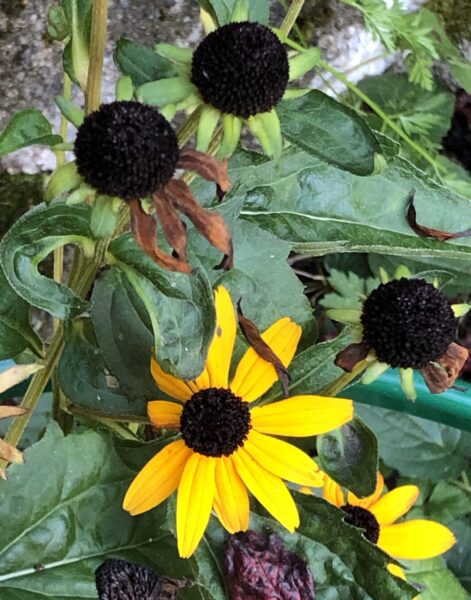Fall Gardening Tips and Resources
Don't stop gardening yet!
October 6, 2021
Fall is a great time to do some very important work in your garden. This is a prime season to improve your soil, get ahead of weeds and set up wildlife resources in the landscape. Give us a call to discuss personal priorities and let us help you get your garden set up for the winter.
- Amend soil – adding compost to your landscape will help protect your soil and plant roots this winter. Compost can add micro-organisms that help provide nutrients to your plants, increase water holding capacity in sandy soil and break up clay soil.
- Mulch your garden beds – adding mulch, a layer of organic material to the surface of the soil around your plants, can help protect your soil from loss of nutrients, modify soil temperatures keeping them warmer through the winter, and keep weeds down this fall and in the spring.
- Tidy up, but not too much! Trim out some dead leaves and stems on your shrubs and perennials but leave some seeded flowerheads on your Echinacea and Rudbeckia to feed the birds in the snow this winter. Leave hollow tubed stems intact in case native bees are quietly nested in them. Learn where the wildlife lives in your garden.
- Plant native plants and other plants good for wildlife. The boost you get from local fauna visiting your garden is invaluable. Encourage them by adding plants that provide shelter, offer food through different seasons, and provide nesting sites and materials. Remember to cater to beneficial insects and native pollinators too It’s a win win project.
- Rake leaves off the lawn and use in your garden beds as mulch. Sure, you can recycle them into compost, which is great, but they are absolute gold for your soil so consider keeping what you can. You can bag them up in plastic bags and store them for the winter to use as stock for a compost bin, bedding for a worm bin, or as leaf mulch in your spring beds. Recycle any leaves that may have animal droppings or street debris in them in the curbside compost bin.
- Repair your lawn. Grass loves cool weather and is growing rapidly now. Take advantage and pull the more disruptive weeds from your lawn (Cat’s Ears perhaps) with hand tools while the soil is wet. Apply a slow release fertilizer to the entire lawn, toss down some suitable northwest grass seed blend across the lawn and top with an inch of compost. Make sure existing grass blades are up out of the topdressing. Don’t walk on for a week or so and let it grow.
- Change out container garden plantings – pansies, chrysanthemums, ornamental kale and cabbage, spring blooming bulbs, hardy succulents, dwarf evergreens, and new perennials for next season are all great options to refresh the summer container garden. Be sure that they get water this winter if they are on a porch or under the eaves of a house.
- Plant cover crop seed, mulch or fully plant your veggie beds. If you don’t have a fully planted winter garden you need to protect your soil this winter. Our heavy rain compacts soil, increases nutrient loss – making soil more acidic, and can waterlog beneficial soil microorganisms. Cover crop seed grows in the fall to protect soil, loosens soil with its deep root system, and adds nutrients when dug into the bed next spring. Mulch with non-diseased or insect infested plants coming out of your beds, fall leaves from the lawn or grass clippings from fall mowings, cover with burlap weighted down with rocks and let it sit. The organic material under the burlap will rot in place, adding nutrients and habitat for the critters in the soil.
- Identify the trees that need pruning when they are dormant and make a plan for how to manage them. Fruit trees may need some attention – learn about it before you have the pruning tools in hand!
- After you get the fall tasks done in the garden have a cup of hot tea and peruse a good garden book to start planning your next spring garden. The seed catalogues are coming soon!
Season: Fall | Tagged bees, compost, container garden, edible, edible plants, evergreens, fall, fall compost, lawn, lawns, Leaves, Mulch, native plants, overseed, soil health, wildlife garden
